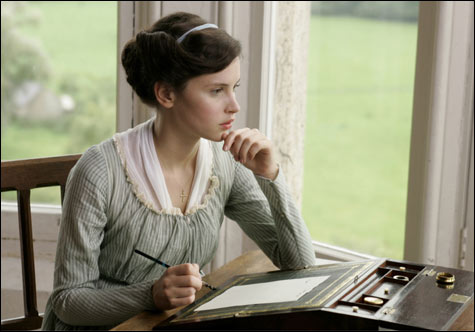
NORTHANGER ABBEY: A wide-eyed, radiant Felicity Jones as Catherine Morland, plus a director with a sense of humor. |
It is a truth universally acknowledged, that there cannot be too many Jane Austen adaptations for film and television. To be sure, Hollywood has turned out just five major-motion-picture versions of her novels — the 1940 Pride and Prejudice (with Greer Garson and Laurence Olivier), the 1995 Sense and Sensibility (with Emma Thompson, Kate Winslet, Alan Rickman, and Hugh Grant), the 1996 Emma (with Gwyneth Paltrow and Jeremy Northam), the 1999 Mansfield Park (with Harold Pinter), and the 2005 Pride and Prejudice (with Keira Knightley and Matthew Macfadyen) — alongside ancillary efforts like the 1995 Clueless (Emma goes to Beverly Hills) and last year’s Becoming Jane and The Jane Austen Book Club. So perhaps Jane can’t compete with James Bond and Star Wars on the big screen, but she remains a hot public-television property on both sides of the Pond. Defying those benighted few who, grousing that there has already been too much Austen power, wonder whether English literature has nothing better with which to tempt us (“Is there no Thackeray? Is there no Trollope?”), Great Britain (ITV, Granada Television, Company Productions, and the BBC) and America (Boston’s WGBH Channel 2) have teamed up to produce a new Masterpiece Theatre series, “The Complete Jane Austen,” that will start this Sunday and run through April 6 (with a three-week pledge-break hiatus March 2-16).Six new Austen adaptations? Well, four. Along with new productions of Persuasion (January 13), Northanger Abbey (January 20), Mansfield Park (January 27), and Sense and Sensibility (March 30 and April 6), we’re getting the 1995 BBC/A&E five-hour Pride and Prejudice mini-series (February 10, 17, and 24) and the 1996 A&E/ITV Emma TV movie (March 23). As compensation for there being no new Pride and Prejudice or Emma, the series is throwing in a new bio-pic, Miss Austen Regrets (February 3), that dramatizes all the proposals Miss Austen is alleged to have turned down.
Although MGM’s enjoyably airbrushed if minimally authentic (for starters, the costumes were handed down from Gone with the Wind) Pride and Prejudice came first, the bedrock of Austen adaptation is the set of six TV versions that the BBC produced between 1971 and 1986. The last of these, Northanger Abbey, is a 90-minute TV movie; the other five are mini-series running between three and five hours. The budgets are low, the sets are stage sets, the acting can be stolid, and the pacing tends to the British theatrical/television drawing-room standard of slow if not obvious. But these productions make room for the details of Austen’s 300-page books, and in Austen the details count. Moreover, they give audiences time to observe, to evaluate, to reflect and consider — just what Austen’s heroines do as they endeavor to separate what seems from what is. The more-recent two-hour theater releases feel more realistic and more immediate and are easier to take in, but at a cost.
And the new WGBH productions? The first three run a compact 85 minutes each — reasonable for the short Persuasion and Northanger Abbey (both published after Austen’s death) but insufficient to do justice to Mansfield Park, which should have been accorded the 170 minutes that the new Sense and Sensibility gets. Directed by Iain B. MacDonald, this Mansfield Park omits all mention of Sir Thomas Bertram’s estate in Antigua and poor relation Fanny Price’s questioning her uncle about the slave trade, and at the end there’s no time for Fanny to return to Portsmouth and be pursued there by Henry Crawford. There is room, however, for much smirking and swaggering, the contemporary notion of making Jane Austen hip. With her full lips, cascading blond tresses, and inviting décolletage, Billie Piper’s Fanny looks more like the poster of Julie Christie in Far from the Madding Crowd, or a serving wench from Tom Jones, than Austen’s meek-to-a-fault heroine. She’s sweet, she’s worthy, she blushes and giggles, but she has no interior life. All the same, she snags her cousin Edmund (a priggish Blake Ritson) — how can he resist when she washes her hair in his presence? He grabs her and kisses her; more blushes and smiles, then cut to waltzing happily ever after.